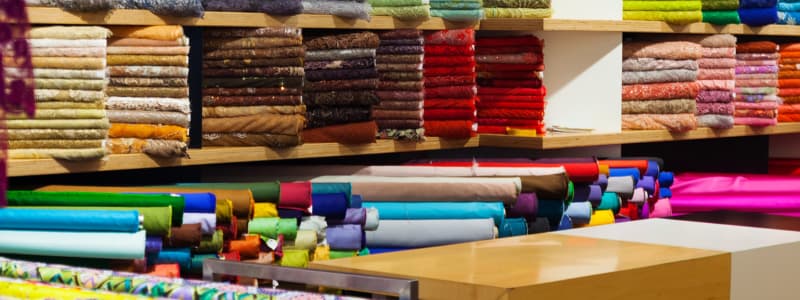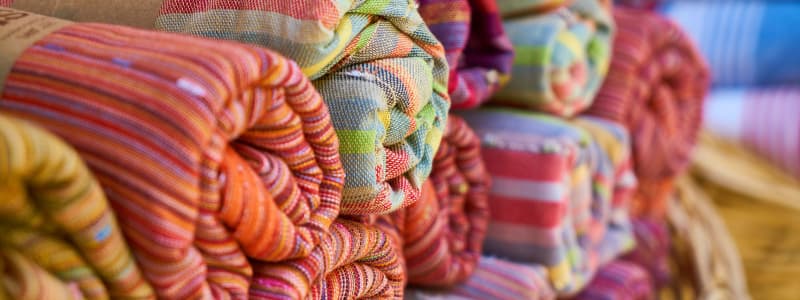| Section | Summary |
|---|---|
| History of the Textile Industry in Denizli | An exploration of the origins and development of Denizli’s textile industry, including its current status and specialities. |
| Supplier Selection and Qualification | Detailed guide on selecting and qualifying suppliers in Denizli’s textile industry for optimal product quality and supply chain efficiency. |
| Ensuring Product Quality | Insight into quality assurance measures, common challenges and ways to overcome them in the textile industry of Denizli. |
| The Role of Quality Control Companies | An overview of how quality control companies like Mars Quality can ensure high standards in Denizli’s textile industry. |
| Conclusion | A summary of the importance of Denizli in the global textile scene and the integral role of quality control in its industry. |
Denizli, a bustling city in the inner Aegean region of Turkey, stands out as a key node in the intricate web of the global textile industry. Its prominence is not a random event but the result of years of rich history, artisan craftsmanship, technological advancement, and judicious quality control measures.
From its ancient roots as a weaving and dyeing center in the Ottoman Empire to its modern-day reputation as a quality textile hub, Denizli has always been synonymous with superior textile production. The city’s textile sector, particularly renowned for its high-quality cotton products such as towels, bathrobes, and denim, has emerged as a major contributor to the Turkish economy and the global textile supply chain.
The magnitude of Denizli’s textile market is marked not just by its volume of output but also by the diversity of its products. From world-class toweling to high-fashion denim and intricately woven carpets, the textile industry in Denizli offers a remarkable breadth of choice to international buyers. This product range, when combined with the city’s commitment to quality and sustainability, makes Denizli a desirable sourcing destination for global buyers.
I. History of the Textile Industry in Denizli
A. Early Beginnings
Initial Weaving and Dyeing Practices
The early textile production in Denizli can be traced back to the ancient civilizations that inhabited the region. Utilizing local resources, including a plethora of natural dyes, these pioneering societies laid the foundation of a tradition that would evolve into a global industry. The initial weaving practices were heavily manual, relying on rudimentary tools and artisan skills. The products, though simple in design, were woven with a precision and quality that even today’s technological advancements strive to emulate.
From a quality management perspective, these early practices were largely reliant on the individual artisan’s skillset. The focus was on preserving the integrity of the raw materials and ensuring each piece reflected the painstaking care and meticulous craftsmanship synonymous with the region. These principles formed the backbone of Denizli’s early quality control ethos.
The Growth of Local Artisanship
As time progressed, the skills honed by these early artisans were passed down through generations, and the textile production in Denizli evolved into a flourishing industry. The city soon became a beacon for local artisanship, with each craftsman contributing unique elements to the collective textile heritage.
During this period, quality control methods were primarily rooted in visual inspection and manual assessment. Despite the absence of standardized protocols or advanced machinery, a combination of rigorous techniques and a deep understanding of the materials ensured the output’s consistency and superior quality.
B. Industrial Revolution and its Impact
Shift from Handicraft to Machinery
With the onset of the Industrial Revolution in the 19th century, the textile industry in Denizli underwent a significant transformation. The introduction of mechanized weaving and dyeing drastically increased production capacity and efficiency, marking a critical shift from handicraft to industrial production.
Quality management also experienced an overhaul during this period. The increased production volumes necessitated more structured and systematic quality control processes. The use of specialized machinery allowed for more accurate measurements and testing, thereby ensuring a consistent standard of quality across the increasingly large batches of textile products.
The Birth of Denizli as a Textile Hub
The successful transition to industrialized production was a watershed moment for Denizli, propelling it to the forefront of the global textile scene. With its unique blend of traditional craftsmanship and advanced manufacturing techniques, Denizli became a sought-after destination for high-quality textile products.
Quality management became an increasingly prominent aspect of the city’s textile industry, laying the groundwork for the comprehensive, engineering-driven quality control systems seen in modern Denizli.
C. Modern Developments
Impact of Globalization
The advent of globalization further propelled Denizli’s growth, opening up new markets and opportunities for expansion. The city’s textile industry responded to these changes with increased innovation, diversifying its product offerings to cater to a global audience.
With this expansion came an increased focus on quality management. Understanding that quality expectations and regulations varied from market to market, Denizli adapted its quality control procedures accordingly. This commitment to consistently meet international quality standards strengthened Denizli’s global reputation as a reliable supplier of superior textile products.
Technological Advancements and Their Role
The rise of advanced technologies in the 21st century brought new capabilities and efficiencies to the textile industry. From automated weaving machines to sophisticated dyeing processes and digital design tools, these technological advancements enabled Denizli to push the boundaries of textile production.
From a quality management perspective, technology has facilitated more accurate, efficient, and comprehensive quality control measures. Modern analytical tools and equipment allow for detailed material testing, while data-driven quality management systems ensure consistent standards across all production processes. The integration of these technological advancements into Denizli’s quality control systems underscores the city’s continued commitment to producing top-quality textiles in a rapidly evolving industry.

II. The Current Textile Industry in Denizli
A. Overview of the Current State of Denizli’s Textile Industry
Influence on the Turkish Economy
Denizli’s textile industry is not just a city-wide affair—it has profound impacts on the Turkish economy as a whole. With a substantial percentage of Turkey’s textile exports originating from Denizli, the city significantly contributes to the country’s GDP and provides employment opportunities for thousands of citizens.
Moreover, the city’s uncompromising commitment to quality and continuous improvement attracts foreign direct investment, boosting the overall economic health of the country. Denizli’s textile industry, thus, plays a significant role in fostering economic resilience and growth at the national level.
B. Denizli’s Textile Specialities
Towels and Bathrobes
Denizli has carved a niche for itself in the global market for towels and bathrobes. With a mastery over the terrycloth production, a form of woven cotton fabric characterized by its absorbency, the city’s manufacturers produce high-quality bath linens that are revered worldwide.
Denim Production
Denizli’s denim production has a significant global presence. Leveraging advanced weaving technology and state-of-the-art dyeing methods, the city’s manufacturers produce a wide range of denim fabrics, catering to various fashion trends and consumer preferences.
Carpet Weaving
Dating back centuries, Denizli’s carpet weaving tradition continues to thrive in the modern textile landscape. Today, the city’s carpet manufacturers combine traditional techniques with modern machinery to create pieces that are as durable as they are beautiful.
Other Noteworthy Products
Apart from the aforementioned items, Denizli also excels in the production of other textile goods such as bed linens, curtains, and upholstery fabrics.
C. Innovations and Future Trends
Sustainability Efforts
With an increasing global emphasis on sustainability, Denizli’s textile industry is actively adopting eco-friendly production practices. From water-efficient dyeing methods to the use of organic and recycled materials, these initiatives demonstrate Denizli’s commitment to sustainable growth.
Such sustainability efforts are also integrated into the quality management systems, ensuring that the eco-friendly measures do not compromise the product’s overall quality. In fact, by prioritizing sustainability, manufacturers often enhance their product’s durability and longevity, further raising the bar for quality standards.
Digitalization and Automation
The textile industry of Denizli is embracing the digital age with open arms. Manufacturers are increasingly incorporating automation in their production lines, resulting in improved efficiency and precision. From automated looms to computer-aided design (CAD) systems for pattern making, digital technology is reshaping Denizli’s textile landscape.
From a quality management perspective, digitalization allows for real-time monitoring and data analysis, enabling manufacturers to detect and rectify issues swiftly. Consequently, the integration of technology not only boosts productivity but also enhances the overall product quality, reaffirming Denizli’s status as a global textile powerhouse.
III. Supplier Selection and Qualification in Denizli

Selecting and qualifying a supplier in the textile industry isn’t just a matter of checking prices and delivery schedules. It is a multidimensional process that influences product quality, brand reputation, supply chain efficiency, and ultimately, the business bottom line.
A. The Importance of Choosing the Right Supplier
Impact on Product Quality
The selection of the right supplier is instrumental in maintaining product quality. The suppliers provide not just the raw materials, but they are also responsible for key aspects of the production process, including weaving, dyeing, printing, and stitching. Any lapses in these processes can lead to defects in the final product, resulting in customer dissatisfaction, returns, and damaging the reputation of your brand.
Influence on Supply Chain Efficiency
The efficiency of your supply chain is intrinsically linked to the performance of your suppliers. Timely delivery, adherence to agreed-upon quantities, and the ability to swiftly address issues are critical factors that can avoid supply chain disruptions. Delays in supply, overstock or understock situations can result in higher costs and lost sales opportunities.
B. How to Select a Textile Supplier in Denizli
Criteria for Selection
When selecting a supplier in Denizli, several criteria should be considered:
- Product Quality: The foremost consideration should be the supplier’s ability to consistently provide high-quality materials. Checking samples, examining their previous work, and inquiring about their quality management systems can provide insights into their commitment to quality.
- Reliability: The supplier’s history in terms of adherence to delivery schedules and consistency in maintaining agreed-upon quality standards is crucial. Any signs of unreliability can disrupt your production process and affect customer relationships.
- Financial Stability: A financially stable supplier is more likely to deliver on their promises and remain a long-term partner. Check their credit rating, financial statements, or seek references from their banking partners.
- Technological Capabilities: Suppliers with advanced technology can often provide better quality products, offer more innovations, and adapt quicker to changes in demand or design.
- Ethical Practices: In an era where consumers and regulators are increasingly conscious of ethical sourcing, it is vital to ensure that the supplier complies with local labor laws, environmental regulations, and has fair trade practices.
- Certifications: Confirm that the supplier holds relevant industry certifications like ISO 9001 (Quality Management), ISO 14001 (Environmental Management), and SA8000 (Social Accountability). These certifications are an indicator of the supplier’s commitment to maintaining global standards.
Researching Potential Textile Suppliers in Denizli
The process of researching potential suppliers involves several steps:
- Preliminary Research: Create a broad list of potential suppliers using industry directories, trade shows, business networks, and online searches.
- Background Checks: Review the supplier’s online presence, public financial records, news articles, and industry forums to get an idea of their reputation, financial health, and any potential red flags.
- Direct Interaction: Interact directly with the suppliers to discuss your specific requirements, their capacity to fulfill those requirements, and to gauge their customer service.
- Reference Verification: Contacting past or existing clients of the suppliers can provide insights into their reliability, product quality, and service levels.
C. Supplier Qualification Process
Supplier Assessment
Once you have shortlisted potential suppliers, a detailed assessment is necessary to evaluate their suitability for your needs:
- Capability Analysis: Review the supplier’s production facilities, machinery, workforce skills, and capacity to meet your volume requirements.
- Quality Systems Review: Assess their quality control systems, defect tracking mechanisms, and methods to handle non-conformities.
- Compliance Check: Verify their adherence to industry standards, environmental regulations, and ethical norms.
- Risk Assessment: Evaluate potential risks involved in partnering with the supplier, such as geopolitical risks, currency fluctuation risks, intellectual property risks, etc.
Audit and Evaluation Techniques
- Supplier Verification Audits: Audits are conducted to verify the manufacturing capabilities, quality control measures, and business stability of the supplier.
- SA8000 Audits: These audits ensure that the supplier adheres to international labor laws, human rights norms, and fair trade practices.
- ISO 14001 Audits: This audit checks the supplier’s commitment to managing their environmental responsibilities.
- ISO 9001 Audits: This audit evaluates the effectiveness of the supplier’s Quality Management System.
Contract Negotiation and Finalization
The final step in the supplier selection and qualification process involves the negotiation and finalization of the contract:
- Pricing: Negotiate the price, keeping in mind that the lowest price might not always guarantee the best quality or service.
- Delivery Schedules: Agree on delivery schedules that align with your production planning and inventory management.
- Quality Assurance: Define clear quality standards, and outline procedures for quality checks, non-compliance penalties, and process for handling defects and returns.
- Contractual Terms: Detailed discussion and agreement on payment terms, order cancellations, contract termination, liability clauses, and confidentiality agreements are necessary to protect your interests.
Selecting and qualifying a supplier is a strategic decision that needs thorough research, rigorous evaluation, and careful negotiation. By selecting the right supplier, you can ensure high product quality, efficient supply chain management, and build a strong, profitable business.
IV. Ensuring Textile Quality in Denizli

Maintaining quality is of paramount importance in the textile industry, more so when operating in a textile hub like Denizli, known for its superior products. Quality control measures are integral to establishing a brand’s reputation, gaining customer trust, and ensuring business longevity.
For a buyer, effective quality control not only safeguards their investment but also protects their brand image in the fiercely competitive marketplace. Hence, investing in robust quality control mechanisms is an essential strategic decision that ensures that the products align with the expected standards and deliver the promised performance.
A. Textile Quality Assurance Solutions in Denizli
Quality assurance in the textile industry spans multiple stages, from fabric inspection to pre-shipment checks. Implementing these measures at various phases of production ensures that any deviations from the established quality standards are promptly identified and rectified.
Fabric Inspection
Fabric inspection forms the initial stage of quality control, ensuring the integrity of the base material before it enters production. This process involves evaluating the fabric for defects such as staining, incorrect colouring, or irregular weave patterns. Employing a system like the 4-Point system, commonly used in the textile industry, can provide a quantitative measure of the fabric quality and determine its suitability for further processing.
During Production Inspection
During production inspection (DUPRO) is a proactive measure that allows early detection and rectification of quality issues during the manufacturing process. DUPRO involves inspecting semi-finished products for design conformity, material quality, and processing techniques. For textiles, this could include examining the weaving, dyeing, and stitching processes to ensure adherence to defined standards.
Pre-shipment Inspection
Pre-shipment inspection is the final quality check before the products are shipped to the buyer. It involves a comprehensive examination of the finished goods, ensuring that they meet the specified quality, quantity, and packaging standards. For textiles, pre-shipment inspection could include checks for correct labelling, colour consistency, proper finishing, and overall aesthetics.
Container Loading Check
Container loading check ensures the secure and correct loading of the goods into the container. This inspection confirms the product quantity, packaging integrity, and appropriate loading methods. It acts as an additional measure to verify that the goods being shipped align with the buyer’s order, and they are appropriately safeguarded during transit.
Textile Lab Testing
Textile lab testing provides an analytical approach to quality control. It involves testing the textile products for various parameters like tensile strength, colourfastness, pilling resistance, and more. Lab testing can also verify the compliance of the products with international standards such as ISO, ASTM, or specific market regulations, thereby providing a solid foundation for the product’s quality credentials.
B. Common Challenges and How to Overcome Them
While implementing quality control measures, several challenges may arise, primarily due to the diverse nature of textile products and their manufacturing processes. However, with proper planning and effective strategies, these challenges can be mitigated.
Variations in Fabric Quality
Variations in fabric quality can arise from factors such as inconsistent raw material quality or fluctuations in production parameters. Implementing a rigorous fabric inspection system can help identify such inconsistencies early in the process. Regular audits of the supplier’s processes can also ensure that the raw material quality is maintained consistently.
Consistency in Dyeing and Printing
Achieving consistency in dyeing and printing is a common challenge in the textile industry. Factors like temperature variations, dye concentration, or fabric type can impact the final colour outcome. Regular during-production inspections and stringent process controls can help monitor these variables and maintain consistency.
Maintenance of Stitching and Weaving Standards
Maintaining consistent stitching and weaving standards is crucial to the product’s final appearance and durability. Challenges can arise due to machine calibration issues or operator errors. Regular machine maintenance, operator training, and frequent quality checks during production can ensure consistent adherence to stitching and weaving standards.
Compliance with Sustainability Standards
With growing consumer awareness, complying with sustainability standards has become a significant challenge. Ensuring the use of eco-friendly materials and practices requires continuous monitoring and verification. Lab testing can validate the eco-friendly claims, while regular audits can ensure that sustainable practices are consistently followed throughout the production process.
Implementing these quality assurance measures can help overcome common challenges and ensure that the final textile product aligns with the desired quality standards, thus strengthening the buyer’s position in the competitive marketplace.
V. The Role of Quality Control Companies
The labyrinthine nature of the textile supply chain can often pose daunting challenges for buyers, especially in assuring consistent product quality. This is where quality control companies step in, providing indispensable services to ensure that the textiles meet the desired standards and are compliant with regulatory norms.
A. How Quality Control Companies Add Value
Quality control companies act as an extension of the buyer’s team, adding significant value to the procurement process in several ways.
Independent Verification
An external quality control company in Denizli provides an independent and unbiased evaluation of the supplier’s operations and product quality. This objectivity helps in identifying potential issues that might be overlooked in self-assessments, thereby ensuring a higher level of quality assurance.
For instance, they conduct detailed inspections at various stages of production, from checking the raw material quality to verifying the final product before shipment. Their independent status ensures that the assessments are not influenced by internal biases, providing a more accurate representation of the quality standards being maintained.
Expertise and Specialized Knowledge
Quality control companies bring in specialized knowledge and expertise, acquired through years of experience across multiple industries and geographies. They understand the nuances of local business cultures, production methodologies, and legal frameworks, making them highly effective in identifying, understanding, and mitigating potential quality risks
.
Their technical expertise also extends to understanding product specifications and testing them against established industry standards. In the complex world of textiles, where product characteristics are influenced by a myriad of factors like material type, weave structure, dyeing techniques, etc., such specialized knowledge is invaluable.
Mars Quality – QC Agency in Denizli
Mars Quality, as a leading quality control agency in Denizli, serves as a robust pillar of support for buyers, safeguarding their interests through a comprehensive suite of solutions. These include:
- Quality Inspections
- During Production Inspections
- Pre-Shipment Inspections
- Product Sorting
- Fabric Inspections
- Supplier Verification
- ISO 9001 Audits
- ISO 14001 Audits
- SA8000 Audits
- Social & Ethical Audits
- Recruitment & Contract Staffing
VI. Conclusion – Sourcing Textile in Denizli
Denizli, rooted deeply in traditional craftsmanship, has adeptly integrated modern technology and evolved as a noteworthy player in the international textile market.
However, the intricate fabric of textile procurement, production, and quality assurance processes necessitates a systematic, multi-faceted approach. From selecting the right supplier and qualifying them through a rigorous assessment process to implementing quality control measures at various production stages, each step contributes significantly to the final product’s quality.
These complexities underscore the pivotal role that quality control companies. With their specialized knowledge, technical expertise, and array of services, these companies provide an indispensable value-add to buyers. They ensure an independent verification of product quality, help navigate the local business practices, and ultimately safeguard the buyers’ investments and reputation.


